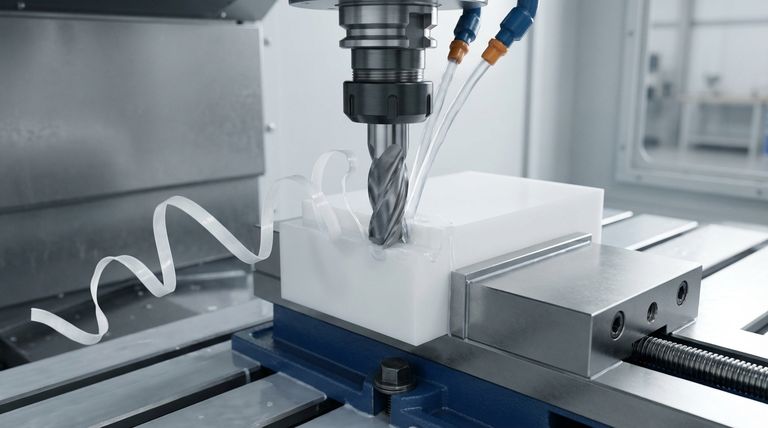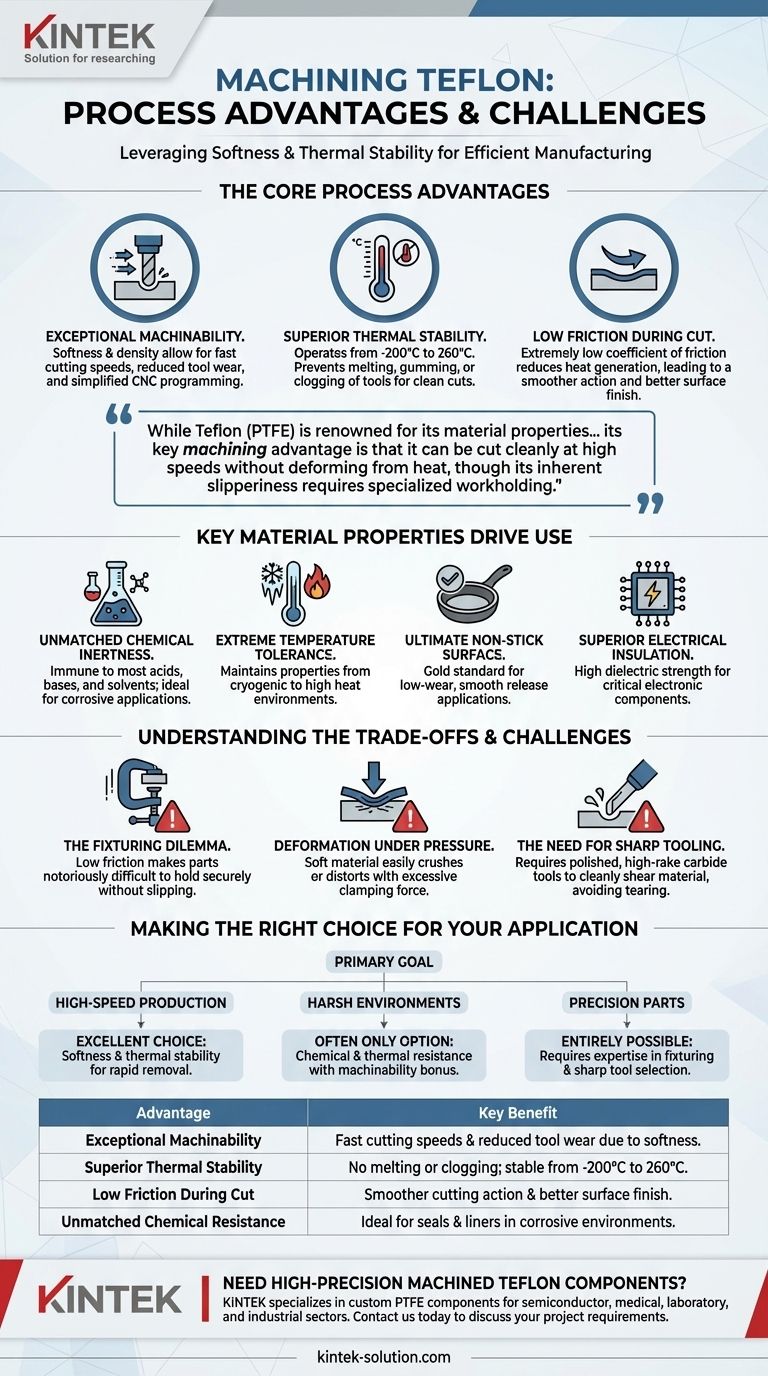The primary process advantages of machining Teflon are its exceptional softness and high thermal stability. This unique combination allows for very high cutting speeds with minimal tool wear and prevents the material from melting or clogging tools, a common issue with other plastics.
While Teflon (PTFE) is renowned for its material properties like chemical resistance and low friction, its key machining advantage is that it can be cut cleanly at high speeds without deforming from heat, though its inherent slipperiness requires specialized workholding.

The Core Process Advantages Explained
Understanding what makes Teflon easy to machine involves looking at how it behaves under the pressure and heat of a cutting tool. Its properties create a forgiving and efficient manufacturing process.
Exceptional Machinability
Teflon's relative softness and density allow cutting tools to move through it with very little resistance. This directly translates to faster production cycles and reduced wear on tooling compared to metals or harder polymers.
This ease of cutting simplifies the programming for CNC machines and often allows for more aggressive removal rates, boosting efficiency.
Superior Thermal Stability
Many plastics will soften, melt, or "gum up" when subjected to the friction and heat of machining. Teflon's wide operating temperature range (from -200°C to 260°C) prevents this entirely.
The material remains stable and does not deform or clog the cutting tool, which is critical for maintaining a clean cut and a high-quality surface finish.
Low Friction During the Cut
Teflon possesses one of the lowest coefficients of friction of any solid material. As a tool cuts through it, this "slipperiness" reduces the amount of friction and heat generated at the cutting edge.
Less friction results in a smoother cutting action, which contributes to a better surface finish on the final part and further reduces tool wear.
Why These Advantages Matter: The Properties of Teflon
The ease of machining Teflon is a significant benefit because its underlying material properties make it an essential choice for demanding applications where other materials fail.
Unmatched Chemical Inertness
Teflon is virtually immune to almost all acids, bases, and solvents. This makes it the ideal choice for components used in corrosive chemical processing, such as seals, gaskets, and linings.
Extreme Temperature Tolerance
The ability to maintain its properties in both cryogenic conditions and high heat makes it invaluable for aerospace, scientific, and industrial applications where temperature swings are extreme.
The Ultimate Non-Stick Surface
Its low coefficient of friction makes it the gold standard for non-stick and low-wear applications. This includes creating bearings, slide plates, and components that require a smooth release.
Superior Electrical Insulation
Teflon is an excellent electrical insulator with high dielectric strength, making it a critical material for manufacturing high-performance connectors, insulators, and circuit components.
Understanding the Trade-offs and Challenges
While easy to cut, Teflon is not without its machining challenges. Its unique properties demand specific techniques to achieve precision.
The Fixturing Dilemma
The same low friction that aids cutting makes Teflon notoriously difficult to hold securely. The part can easily slip or vibrate within a clamp or vise if excessive tool pressure is applied.
This requires careful fixture design and clamping strategies to hold the part firmly without damaging its soft surface.
Deformation Under Pressure
As a soft material, Teflon can easily be crushed or distorted by excessive clamping force. Machinists must use just enough pressure to secure the part without compromising its dimensional accuracy.
The Need for Sharp Tooling
To achieve a clean, precise cut, tools must be extremely sharp. Polished, high-rake carbide tools are often recommended to cleanly shear the material rather than push or tear it, which can result in a poor surface finish.
Making the Right Choice for Your Application
Balancing Teflon's elite material properties with its unique machining characteristics is key to leveraging it effectively. Your primary goal will determine your approach.
- If your primary focus is high-speed production: Teflon is an excellent choice, as its softness and thermal stability allow for rapid material removal and long tool life.
- If your primary focus is performance in harsh environments: Teflon's chemical and thermal resistance often makes it the only viable option, and its machinability is a significant manufacturing bonus.
- If your primary focus is tight-tolerance, high-precision parts: Machining Teflon is entirely possible but requires expertise in fixturing and tool selection to overcome its tendency to slip and deform.
Ultimately, Teflon's advantages make it a uniquely valuable material that is surprisingly simple to machine once its specific handling requirements are mastered.
Summary Table:
| Advantage | Key Benefit |
|---|---|
| Exceptional Machinability | Fast cutting speeds & reduced tool wear due to softness. |
| Superior Thermal Stability | No melting or clogging; stable from -200°C to 260°C. |
| Low Friction During Cut | Smoother cutting action & better surface finish. |
| Unmatched Chemical Resistance | Ideal for seals & liners in corrosive environments. |
Need high-precision machined Teflon components?
At KINTEK, we specialize in manufacturing custom PTFE components (seals, liners, labware, and more) for the semiconductor, medical, laboratory, and industrial sectors. Our expertise in precision machining ensures your parts meet the tightest tolerances, leveraging Teflon's full advantages for your application.
Contact us today to discuss your project requirements—from prototypes to high-volume production—and see how our custom fabrication can benefit you.
Visual Guide

Related Products
- Custom PTFE Parts Manufacturer for Teflon Parts and PTFE Tweezers
- Custom PTFE Parts Manufacturer for Teflon Containers and Components
- Customizable PTFE Rods for Advanced Industrial Applications
- Custom PTFE Teflon Balls for Advanced Industrial Applications
- Custom PTFE Sleeves and Hollow Rods for Advanced Applications
People Also Ask
- What are the main applications of PTFE type Teflon? Unlock Its Versatility for Your Industry
- What are the unique properties of PTFE? Unlock Unmatched Performance in Demanding Applications
- What factors should be considered when choosing between Nylon and PTFE? Select the Right Material for Your Application
- What design considerations are important for custom PTFE parts? Design for Performance & Reliability
- What are the unique properties of PTFE? The 3 Pillars Driving Demand for High-Performance Parts



















